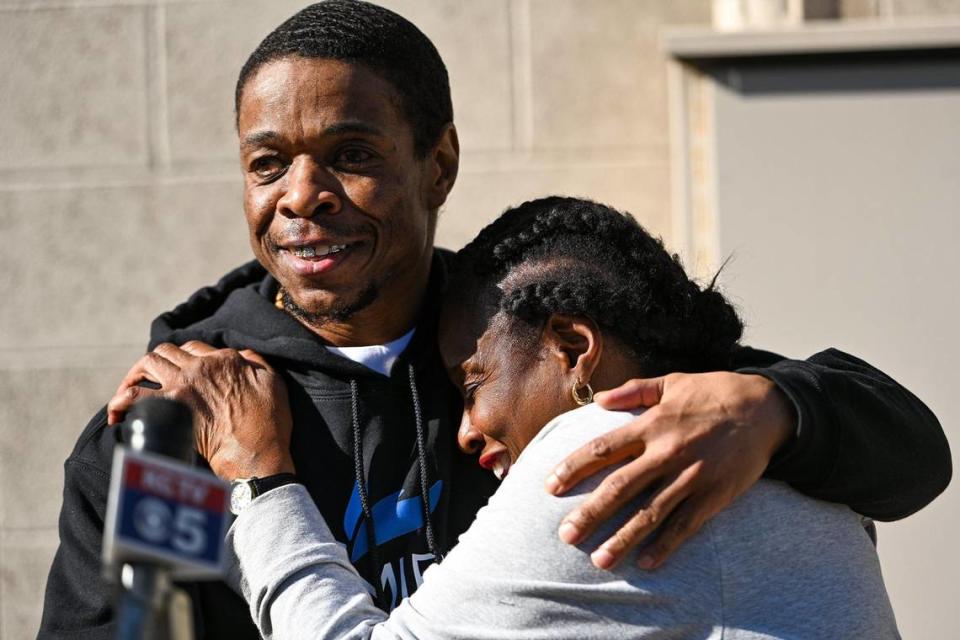Man freed from prison sues KCPD, alleges officers framed him for murder he didn’t commit
Keith Carnes, who spent more than 18 years in prison before he was freed in 2022, filed a lawsuit Wednesday against Kansas City police that alleges officers framed him for a murder he did not commit.
The petition, filed in the Western District of Missouri, claims KCPD officers hid evidence and coerced witnesses to “pin” a 2003 fatal shooting on Carnes, now 53. The lawsuit also names a former assistant prosecutor and several officers.
Carnes was convicted of first-degree murder and armed criminal action in the Oct. 6, 2003, killing of Larry White, who was shot in a parking lot at 29th Street and Prospect Avenue. Carnes was sentenced to life in prison.
He was released last year after Jackson County prosecutors declined to refile charges against him, saying — though they were unconvinced of his innocence — there was insufficient evidence to bring the case to trial again.
That decision came days after the Missouri Supreme Court tossed Carnes’ conviction because an eyewitness’ account was not disclosed to Carnes’ defense team, in what is known as a Brady violation.

Carnes’ lawsuit is at least the third filed against KCPD in recent memory that alleges misconduct led to a wrongful conviction. Kevin Strickland, who spent 43 years in prison for a triple murder he did not commit, and Ricky Kidd, who served 23 years for a double killing he did not commit, have also filed suit.
As it does in response to most lawsuits, the Kansas City Police Department said Wednesday it does not comment on pending litigation to “ensure fairness for all sides involved.”
Carnes’ lawsuit alleges KCPD officers “produced a series of false and fraudulent reports” in the case and ignored leads that a feared drug dealer was the real killer. While evidence emerged of the other suspect, officers “stuck to their scheme” and hid evidence of Carnes’ innocence, according to his lawyers with the Chicago-based law firm Loevy & Loevy.
“While nothing can return the 18 years that Keith lost, this lawsuit is a step towards justice for Keith and his family,” one of his attorneys, Locke Bowman, said in a statement. “The Kansas City police practices described in this lawsuit — fabricating evidence to secure convictions and propel officers’ own careers forward — amount to corruption.”
Two witnesses in the case, Wendy Lockett and Lorraine Morrow, testified that Carnes chased White and shot him multiple times.
But in 2014, Lockett recanted her testimony, alleging that she had been coerced into identifying Carnes. Morrow also recanted her testimony and recalled being pressured by then-Assistant Prosecutor Amy McGowan into picking Carnes.
The lawsuit alleges Morrow told McGowan she saw the other drug dealer shoot White, but that McGowan suppressed evidence and threatened Morrow with jail time “if she failed to deliver the false testimony that McGowan had planted.”
Carnes is suing McGowan, who also prosecuted Kidd, as well as the Kansas City Board of Police Commissioners, which oversees the department. The Star could not reach McGowan for comment.
Further complicating Carnes’ case, Lockett testified in a 2021 court hearing that her original testimony actually was accurate and she was harassed into recanting by Carnes’ supporters.
At the same hearing, Morrow said she was suffering from too many medical conditions to remember the night of the murder clearly.
When prosecutors dropped the charges against Carnes, they said a special master’s investigation found no prosecutorial misconduct in the case. Prosecutors also blasted a private investigator who reviewed Carnes’ case, saying she pressured witnesses to recant.
Carnes’ lawyers noted that Missouri only compensates people freed with DNA evidence, which was not the case in Carnes’ exoneration and is not how most innocent prisoners win their freedom.


